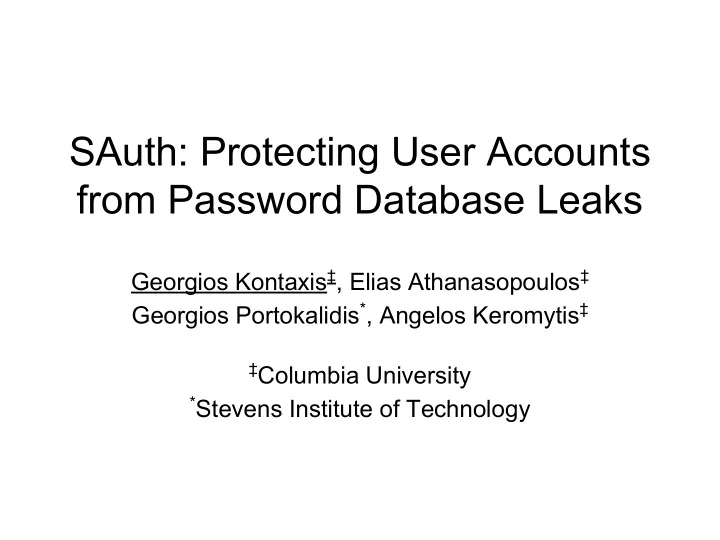

SAuth: Protecting User Accounts from Password Database Leaks Georgios Kontaxis ‡ , Elias Athanasopoulos ‡ Georgios Portokalidis * , Angelos Keromytis ‡ ‡ Columbia University * Stevens Institute of Technology
Authentication recognizes passwords not users …
… and unfortunately passwords get leaked
With stolen password, Attacker impersonates Alice
Password leaks happen all the time • May go unnoticed until it’s too late 2009 RockYou Gaming 32.0 million 2010 Gawker Media 1.5 million Domino attack prompted resets in other sites 2011 Sony 1.0 million 2012 LinkedIn 6.5 million 2013 Twitter 250.000 Before being detected and shut down 2013 Adobe 150.0 million
Passwords get cracked all the time • Weak passwords – short, dictionary words, names, patterns, etc. • Fast hardware – Commodity parallel architectures (GPUs) – Cloud-powered cracking platforms • 6 days after the 6.5 million LinkedIn password leak, 90% of them were cracked
Enhanced Authentication Today • Two-Factor Authentication – How many tokens/app can a user handle? • Single sign-on services – Single point of failure – Relying party gets to find out user identity* – Privacy issues from coarse-grained data sharing
How about Authentication Synergy? • Forgot your password?
How about Authentication Synergy? • User’s Authentication State
SAuth: Synergy-based Enhanced Authentication • We propose: cooperating sites pool authentication resources
SAuth: Synergy-based Enhanced Authentication • We propose: cooperating sites pool authentication resources
SAuth: Synergy-based Enhanced Authentication • We propose: cooperating sites pool authentication resources
SAuth: Synergy-based Enhanced Authentication • We propose: cooperating sites pool authentication resources
SAuth: Synergy-based Enhanced Authentication • We propose: cooperating sites pool authentication resources
SAuth: Synergy-based Enhanced Authentication • We propose: cooperating sites pool authentication resources
SAuth: Synergy-based Enhanced Authentication • We propose: cooperating sites pool authentication resources
SAuth: Synergy-based Enhanced Authentication • Password leak on Evernote will protect account access
SAuth: Synergy-based Enhanced Authentication • Attacker has compromised Alice’s password on Evernote
SAuth: Synergy-based Enhanced Authentication • Attacker impersonates Alice on Evernote
SAuth: Synergy-based Enhanced Authentication • Attacker is unable to produce Alice’s Twitter password
SAuth: Synergy-based Enhanced Authentication • Authentication process fails, Evernote denies access
Password Reuse Woes • User has 7 passwords, re-uses 5 of them • Password shared across 6 sites [Florencio WWW ’07]
Decoy Passwords • Uncertainty about the actual password • Store N-1 decoy passwords along • Attack reduced to online guessing • All decoys are valid passwords, server does not know the difference Username P[0] P[1] P[…] P[N] • How many decoys? – 16,384 for NIST L2 security when password is reused
Realistic Decoy Passwords • User password must blend-in with the decoys – Crackers are already factoring in human behavior – Complex vs Popular Passwords string-digit 37% digit-string 05% ! 10% $ 03% - RockYou Leak ‘09 – Ideal: have the user type N passwords, remember 1 – Practical: generation within the password ecosystem • Any blind automated method will generate outliers • Probabilistic production seeded by user’s password, biased towards structures of similar popularity and semantics
Summary • Authentication Synergy results in leak-resistant password authentication – Complements existing security – Respect for user privacy, verifiable site cooperation – Minimal changes server-side, no changes client-side • Decoys mitigate password reuse habits – Generated off the user password, consider its context and general human password habits
tinyurl.com/sauth kontaxis@cs.columbia.edu
Intentionally left blank
Intentionally left blank
Unintentionally left blank
Honeywords, Kamouflage and SAuth Decoy Passwords • Honeywords – Does not yet consider human password habits – Honeywords are not valid passwords – Use of any honeyword will raise an alarm – Auxiliary honeychecking server • Kamouflage password manager – Considers human password habits – Master password decoys are all valid – Online guessing attack should raise alarm • SAuth Decoy Passwords – Considers human password habits – Decoy passwords are all valid – Online guessing attack should raise alarm
Recommend
More recommend